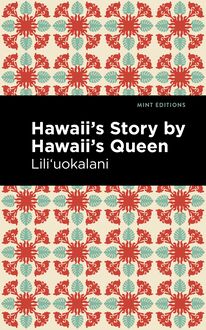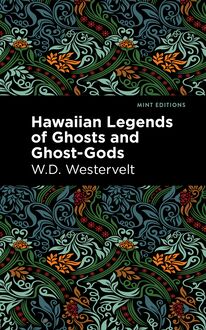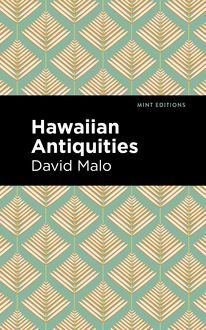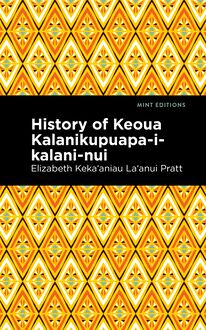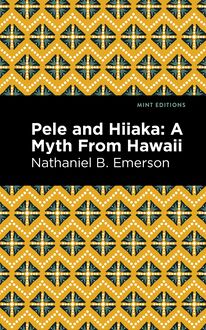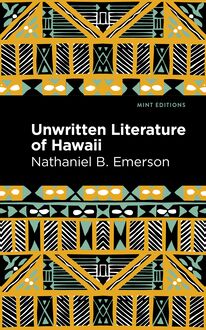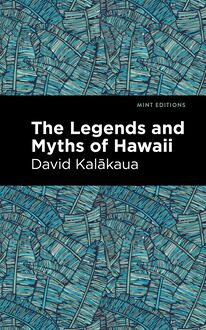-
 Univers
Univers
-
 Ebooks
Ebooks
-
 Livres audio
Livres audio
-
 Presse
Presse
-
 Podcasts
Podcasts
-
 BD
BD
-
 Documents
Documents
-
- Cours
- Révisions
- Ressources pédagogiques
- Sciences de l’éducation
- Manuels scolaires
- Langues
- Travaux de classe
- Annales de BEP
- Etudes supérieures
- Maternelle et primaire
- Fiches de lecture
- Orientation scolaire
- Méthodologie
- Corrigés de devoir
- Annales d’examens et concours
- Annales du bac
- Annales du brevet
- Rapports de stage
La lecture à portée de main
Vous pourrez modifier la taille du texte de cet ouvrage
Découvre YouScribe en t'inscrivant gratuitement
Je m'inscrisDécouvre YouScribe en t'inscrivant gratuitement
Je m'inscrisEn savoir plus
Vous pourrez modifier la taille du texte de cet ouvrage
En savoir plus

Description
The Kumulipo (1897) is a traditional chant translated by Lili‘uokalani. Published in 1897, the translation was written in the aftermath of Lili‘uokalani’s attempt to appeal on behalf of her people to President Grover Cleveland, a personal friend. Although she inspired Cleveland to demand her reinstatement, the United States Congress published the Morgan Report in 1894, which denied U.S. involvement in the overthrow of the Kingdom of Hawaii. The Kumulipo, written during the Queen’s imprisonment in Iolani Palace, is a genealogical and historical epic that describes the creation of the cosmos and the emergence of humans, plants, and animals from “the slime which established the earth.” “At the time that turned the heat of the earth, / At the time when the heavens turned and changed, / At the time when the light of the sun was subdued / To cause light to break forth, / At the time of the night of Makalii (winter) / Then began the slime which established the earth, / The source of deepest darkness.” Traditionally recited during the makahiki season to celebrate the god Lono, the chant was passed down through Hawaiian oral tradition and contains the history of their people and the emergence of life from chaos. A testament to Lili‘uokalani’s intellect and skill as a poet and songwriter, her translation of The Kumulipo is also an artifact of colonization, produced while the Queen was living in captivity in her own palace. Although her attempt to advocate for Hawaiian sovereignty and the restoration of the monarchy was unsuccessful, Lili‘uokalani, Hawaii’s first and only queen, has been recognized as a beloved monarch who never stopped fighting for the rights of her people. With a beautifully designed cover and professionally typeset manuscript, this edition of Lili‘uokalani’s The Kumulipo is a classic of Hawaiian literature reimagined for modern readers.
Sujets
Informations
| Publié par | Mint Editions |
| Date de parution | 21 juin 2021 |
| Nombre de lectures | 0 |
| EAN13 | 9781513223858 |
| Langue | English |
| Poids de l'ouvrage | 1 Mo |
Informations légales : prix de location à la page 0,0350€. Cette information est donnée uniquement à titre indicatif conformément à la législation en vigueur.
Extrait
The Kumulipo
Lili‘uokalani
The Kumulipo was first published in 1897.
This edition published by Mint Editions 2021.
ISBN 9781513299556 | E-ISBN 9781513223858
Published by Mint Editions ®
minteditionbooks.com
Publishing Director: Jennifer Newens
Design & Production: Rachel Lopez Metzger
Project Manager: Micaela Clark
Typesetting: Westchester Publishing Services
H E P ULE H OOLAA A LII
(An ancient prayer for the dedication of the high chief Lonoikamakahiki to the gods, soon after his birth, and at which time the honors of Kapu, Wela, Hoano, and Moe were conferred on him by his father, Keaweikekahialiiokamoku, King of Hawaii. After the ceremony his name was changed to Ka I i Mamao.)
H E K UMULIPO
( T HE C REATION )
F OR
K A I I M AMAO
F ROM H IM TO H IS D AUGHTER , A LAPAI W AHINE .
C ONTENTS I NTRODUCTION T HE F IRST E RA, OR A GE T HE S ECOND E RA T HE T HIRD E RA T HE F OURTH E RA T HE F IFTH E RA T HE S IXTH E RA T HE S EVENTH E RA T HE E IGHTH E RA T HE N INTH E RA T HE T ENTH E RA T HE E LEVENTH E RA T HE T WELFTH E RA A B RANCH OF THE T WELFTH E RA T HE F OURTEENTH E RA T HE F IFTEENTH E RA T HE S IXTEENTH E RA
I NTRODUCTION
There are several reasons for the publication of this work, the translation of which pleasantly employed me while imprisoned by the present rulers of Hawaii. It will be to my friends a souvenir of that part of my own life, and possibly it may also be of value to genealogists and scientific men of a few societies to which a copy will be forwarded. The folk-lore or traditions of an aboriginal people have of late years been considered of inestimable value; language itself changes, and there are terms and allusions herein to the natural history of Hawaii, which might be forgotten in future years without some such history as this to preserve them to posterity. Further, it is the special property of the latest ruling family of the Hawaiian Islands, being nothing less than the genealogy in remote times of the late King Kalakaua,—who had it printed in the original Hawaiian language,—and myself.
This is the very chant which was sung by Puou, the High Priest of our ancient worship, to Captain Cook whom they had surnamed Lono, one of the four chief gods, dwelling high in the heavens, but at times appearing on the earth. This was the cause of the deification of Captain Cook under that name, and of the offerings to him made at the temple or Heiau at Hikiau, Kealakekua, where this song was rendered.
Captain Cook’s appearance was regarded by our people then as a confirmation of their own traditions. For it was prophesied by priests at the time of the death of Ka-I-i-mamao that he, Lono, would return anew from the sea in a Spanish man-of-war or Auwaalalua. To the great navigator they accordingly gave a welcome with the name of Lono.
The chanters of this great poem were Hewahewa and Ahukai, and by them it was originally dedicated to Alapai, our ancestress, a woman-chief of the highest rank, then at Koko Oahu. Keeaumoku was lying on his death-bed. The Lonoikamakahiki, of whom this chant sings so eloquently in our native tongue, is none other than Kalaninuiiamamao (Ka-I-i-mamao). His name was also Lonoikamakahiki. He was thus called by his mother, Lonomaikanaka, from the very moment of his birth. It was his grandmother Keakealani who changed his name at the time he was dedicated to the gods and the sacred tabus of the Wela, Hoano, and the Moe; or, translated, Fire, Honor, and Adoration were conferred upon him at the time when his navel string was cut at the Heiau at Nueku, Kahaluu, Kona, Hawaii. The correct name of this chief was Ka-I-i-mamao, but the bards of his day named him in their chants Kalaninuiiamamao; thus he was styled in their Mele or chant called Kekoauli-kookea ka lani. The words “lani nui” were simply inserted by them as it was their intention to hand the young prince’s name down to posterity in song, while to explain the object of the parents in naming him Ka-I-i-mamao it signified that when Keawe married Lonoma-I-Kanaka it was an infusion of a new royal blood with that of their own royal line of I, the father of Ahu, the grandfather of Lonomaikanaka. By this it was also intended to show that he, that is Ka-I-i-mamao, was above all other I’s, for there were many families, descendants of I, a high and powerful chief, and the last term, “mamao,” means “far off” and above all the rest of the I’s.
Before he was deposed by the people of Kau he was called Wakea on account of his wicked actions, and, like Wakea, he married his own daughter. By this name he wandered through the wilds of Kahihikolo at Kalihikai, Kalihiwai, and Hanalei, and ultimately became demented. Through all his wanderings he was followed by his faithful attendant and retainer Kapaihi a Hilina.
This historical character is distinct from the Lonoikamakahiki, son of Keawenuiaumi, the same one who challenged
Kakuhihewa at checkers, Konane. He figured at a different period. There were really three persons of the name of Lonoikamakahiki; the first of these was the son of Keawenuiaumi; the second was a celebrated hunchback son of Kapulehuwaihele, and belonged to Makakaualii. The third Lonoikamakahiki is the one for whom this prayer was composed. His parents were Keaweikekahialiiokamoku and Lonomaikaamaka. Ka-I-i-mamao was the father of Kalaniopuu, this last-named being ancestor in the third degree of King Kalakaua, who reigned over the Hawaiian kingdom from 1874 to 1891, and of Lili‘uokalani, who reigned from 1891 to 1893. He was also ancestor in second and third degree to the wife of Kalakaua, at present the dowager Queen Kapiolani.
It will be seen, therefore, that as connecting the earlier kings of ancient history with the monarchs latest upon the throne this chant is a contribution to the history of the Hawaiian Islands, and as it is the only record of its kind in existence it seemed to me worthy of preservation in convenient form.
I have endeavored to give the definition of each name as far as it came within my knowledge of words, but in some cases this could not be done because the true signification has been lost. The ancient Hawaiians were astronomers, and the terms used appertained to the heavens, the stars, terrestrial science, and the gods. Curious students will notice in this chant analogies between its accounts of the creation and that given by modern science or Sacred Scripture. As with other religions, our ancient people recognized an all-powerful evil spirit: Mea was the King of Milu as Satan is of the infernal regions, or hell.
I hope that to some interested in all that pertains to Hawaii, this may give one-half the pleasure which it gave to me in the translation and preparation of the manuscript.
L ILI‘UOKALANI , of Hawaii ,
Patron of the Polynesian Historical Society
T HE F IRST E RA, OR A GE
F IRST V ERSE
At the time that turned the heat of the earth,
At the time when the heavens turned and changed,
At the time when the light of the sun was subdued
To cause light to break forth,
At the time of the night of Makalii (winter)
Then began the slime which established the earth,
The source of deepest darkness.
Of the depth of darkness, of the depth of darkness,
Of the darkness of the sun, in the depth of night,
It is night,
So was night born.
S ECOND V ERSE
Kumulipo was born in the night, a male.
Poele was born in the night, a female.
A coral insect was born, from which was born perforated coral.
The earth worm was born, which gathered earth into mounds,
From it were born worms full of holes.
The starfish was born, whose children were born starry.
The phosphorous was born, whose children were born phosphorescent.
The Ina was born Ina (sea egg).
The Halula was born Halula (sea urchin).
Shell-fish.
The Hawae was born, the Wana-ku was its offspring.
The Haukeuke was born, the Uhalula was its offspring.
The Pioe was born, the Pipi was its offspring (clam oyster).
The Papaua was born, the Olepe was its offspring (pearl and oyster).
The Nahawele was born, the Unauna was its offspring (muscle and crab in a shell).
The Makaiaulu was born, the Opihi was its offspring.
The Leho was born, the Puleholeho was its offspring (cowry).
The Naka was born, its offspring was Kupekala (rock oysters).
The Makaloa was born, the Pupuawa was its offspring.
The Ole was born, the Oleole was its offspring (conch).
The Pipipi was born, the Kupee was its offspring (limpets).
Kane was born to Waiololi, a female to Waiolola.
The Wi was born, the Kiki was its offspring.
The Akaha’s home was the sea;
Guarded by the Ekahakaha that grew in the forest.
A night of flight by noises
Through a channel; water is life to trees;
So the gods may enter, but not man.
T HIRD V ERSE
Seaweed and grasses
Man by Waiololi, woman by Waiolola,
The Akiaki was born and lived in the sea;
Guarded by the Manienie Akiaki that grew in the forest.
A night of flight by noises
Through a channel; water is life to trees;
So the gods may enter, but not man.
F OURTH V ERSE
Man by Waiololi, woman by Waiolola,
The Aalaula was born and lived in the sea;
Guarded by the Alaalawainui that grew in the forest.
A night of flight by noises
Through a channel; water is life to trees;
So the gods may enter, but not man.
F IFTH V ERSE
Man by Waiololi, woman by Waiolola,
The Manauea was born and lived in the sea;
Guarded by the Kalo Manauea that grew in the forest.
A night of flight by noises
Through a channel; water is life to trees;
So the gods may enter, but not man.
S IXTH V ERSE
Seaweed and grasses
Man by Waiololi, woman by Waiolola,
The Koeleele was born and lived in the sea;
Guarded by the Ko punapuna Koeleele that grew in the forest.
A night of flight by noises
Through a channel; water is l
-
 Univers
Univers
-
 Ebooks
Ebooks
-
 Livres audio
Livres audio
-
 Presse
Presse
-
 Podcasts
Podcasts
-
 BD
BD
-
 Documents
Documents
-
Jeunesse
-
Littérature
-
Ressources professionnelles
-
Santé et bien-être
-
Savoirs
-
Education
-
Loisirs et hobbies
-
Art, musique et cinéma
-
Actualité et débat de société
-
Jeunesse
-
Littérature
-
Ressources professionnelles
-
Santé et bien-être
-
Savoirs
-
Education
-
Loisirs et hobbies
-
Art, musique et cinéma
-
Actualité et débat de société
-
Actualités
-
Lifestyle
-
Presse jeunesse
-
Presse professionnelle
-
Pratique
-
Presse sportive
-
Presse internationale
-
Culture & Médias
-
Action et Aventures
-
Science-fiction et Fantasy
-
Société
-
Jeunesse
-
Littérature
-
Ressources professionnelles
-
Santé et bien-être
-
Savoirs
-
Education
-
Loisirs et hobbies
-
Art, musique et cinéma
-
Actualité et débat de société
- Cours
- Révisions
- Ressources pédagogiques
- Sciences de l’éducation
- Manuels scolaires
- Langues
- Travaux de classe
- Annales de BEP
- Etudes supérieures
- Maternelle et primaire
- Fiches de lecture
- Orientation scolaire
- Méthodologie
- Corrigés de devoir
- Annales d’examens et concours
- Annales du bac
- Annales du brevet
- Rapports de stage
